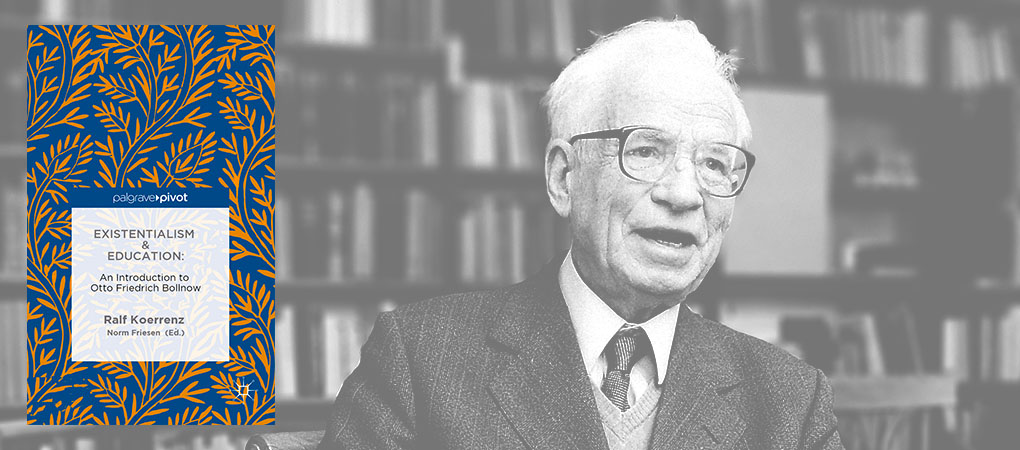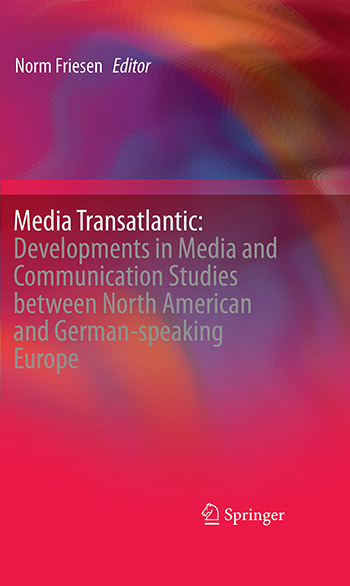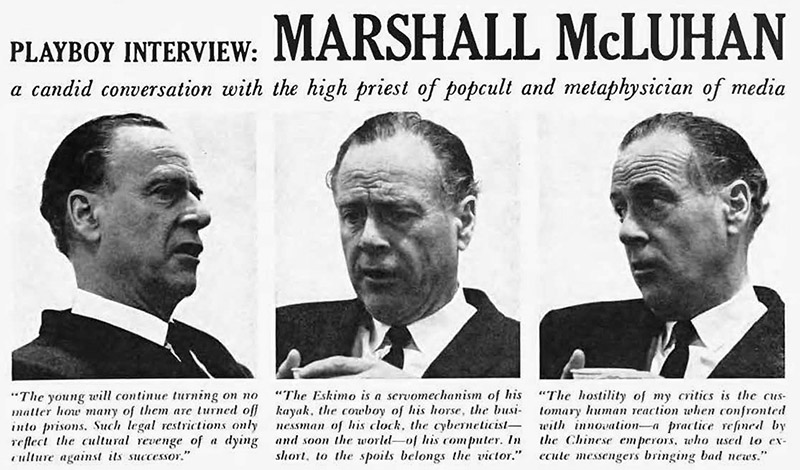I thought I’d one of the most famous of McLuhan’s texts: His interview with Playboy Magazine from March of 1969. He is at his most exuberant and outspoken throughout, especially in describing his vision of a “new society” of “mythic integration” that will emerge through new electronic media. So here it is with original pagination, even advertising (which McLuhan celebrated as the greatest art of our time–you be the judge).
I’m not sure why this hasn’t been done before, but better late than never!
Marshall McLuhan: Playboy Interview
The Lecture is Dead; Long live the Lecture!
Recent interview with Dr. Chris Haskell, Boise State University.
The Pedagogical Relation @ AERA 2017
Here’s the abstract for a paper that I’ll be giving in the Philosophical Studies in Education SIG at AERA coming up in April 2017:
The pedagogical relation, the idea of a special relationship between educator and educand, has long been a central theme in interpretive and philosophical studies of education. Broader concern with “student-teacher relations” and “pedagogies of relation” is also common across educational discourses. German educationist Herman Nohl was the first to define the phrase “pedagogical relation” in 1926. Others have followed in his wake, with Max van Manen introducing the concept into English some 65 years later, and Gert Biesta drawing attention to it more recently. Despite ongoing interest, Nohl’s original characterizations have yet to be translated and their subsequent development reviewed. This paper inaugurates this task, while also taking time to hesitate—to point out its problematic moments and challenges.
See the complete text here.
What is it like to learn? An introduction to "Learning-as-Experience"
Learning-as-experience, learning as it one lives or undergoes it everyday, exposes the Achilles heel of any learning “theory:” Namely, that we have almost no quantifiable, empirical access to learning as a phenomenon, and that the only thing of this kind we can grasp—however tentatively—is the supposed result of it, its “outcomes.” Even with advanced MRI technologies, the moment of learning and the exact way it takes place are unclear: all we know is which parts of the brain are active at which times. The best teacher, of course, can neither cause nor guarantee the learning of his or her students. Even students can say that they actually “learned something” only after the fact. This notoriously evasive nature of learning remains an open secret among “learning scientists” and other researchers and theorists claiming to have learning as their central focus.
So what does it mean to live or undergo learning? What is elusive experience of learning actually like? See this paper (a draft submitted for review) for more.
Translating Schleiermacher on Education, 1826
I’ve been working with my colleague, Karsten Kenklies, on translating Schleiermacher’s 1826 Introductory Lecture on Education (Erziehung). Here’s a couple of key passages from the first, translated half of the lecture, which seeks to provide the “Outlines of the Art of Education and Upbringing (Erziehung)”
Download some selections from Schleiermacher’s opening.
Existentialism and Education: An Introduction to Otto Friedrich Bollnow (forthcoming)
 About a new book, written by Ralf Koerrenz, forthcoming from Palgrave, edited and co-translated by yours truly:
About a new book, written by Ralf Koerrenz, forthcoming from Palgrave, edited and co-translated by yours truly:
Otto Friedrich Bollnow, one of the most famous of Martin Heidegger’s students, developed a philosophical approach to education that brought Heidegger’s existentialism together with other theories of what it is to be “human.” The result is an approach to education that is at once accessible but nuanced, general and comprehensive but also concrete and particularistic. This introduction to Bollnow is the first to provide a biographical and thematic overview of his philosophy of education. It begins with a summary of the theoretical influences that Bollnow synthesized, and then outlines Bollnow’s highly original account of experiential “educational reality” –namely, as a reality alternately “harmonious” or “broken,” but fundamentally “guided.” This book will be of value to scholars and students of education and philosophy, especially those interested in bringing larger existential questions into connection with everyday educational engagement.
See sample (table of contents and first chapter).
New Book: Media Transatlantic!
 I have a new book out as of the end of May. It’s published by Springer and titled Media Transatlantic: Media and Communication Studies between North American and German-speaking Europe. Here’s the blurb:
I have a new book out as of the end of May. It’s published by Springer and titled Media Transatlantic: Media and Communication Studies between North American and German-speaking Europe. Here’s the blurb:
This book reflects recent scholarly and theoretical developments in media studies, or Medienwissenschaft. It focuses on linkages between North America and German‐speaking Europe, and brings together and contextualizes contributions from a range of leading scholars. In addition to introducing English‐language readers to some of the most prominent contemporary German media theorists and philosophers, including Claus Pias, Sybille Krämer and Rainer Leschke, the book shows how foundational North American contributions are themselves inspired and informed by continental sources. This book takes Harold Innis or Marshall McLuhan (and other members of the “Toronto School”) as central points of reference, and traces prospective and retrospective lines of influence in a cultural geography that is increasingly global in its scope. In so doing, the book also represents a new episode in the international reception and reinterpretation of the work of Innis and McLuhan, the two founders of the theory and study of media.
Further information: http://www.springer.com/us/book/9783319284873
Psychology & Neurology are Constructed via Media and "the Social"
Given the socially and technologically contingent nature of symptoms like the “flashback,” neuroscience alone cannot be expected to provide ready answers. This symptomatology of the flashback and its use as a narrative device was developed in the “age of film,” Before this, former soldiers reported seeing ghosts and phantoms. The author argues that we need the humanities, like literature and history, to provide a sense of cultural and historical context to understand whats “going on in our brains.”
Education as Remembrance: Presentation at University College London
 On January 27, I gave paper at the Institute of Education at UCL London. The topic was Klaus Mollenhauer’s conception of Education and Bildung –as articulated in his Forgotten Connections: On Culture and Upbringing.
On January 27, I gave paper at the Institute of Education at UCL London. The topic was Klaus Mollenhauer’s conception of Education and Bildung –as articulated in his Forgotten Connections: On Culture and Upbringing.
The abstract is below; and here’s a link to the complete text of my talk.
The talk was based on Mollenhauer’s Introduction to his text, which can be accessed here.
Klaus Mollenhauer’s Forgotten Connections: Education as Remembrance
Franz Kafka opens his intimate “Letter to his Father” by admitting that he simply cannot come to terms with his own upbringing and Bildung –“because the magnitude of the matter goes far beyond the scope of memory and understanding.” This admission is used, perhaps paradoxically, to introduce and frame an educational “undertaking of remembrance” attempted by German educationist Klaus Mollenhauer in his book Forgotten Connections: On Culture and Upbringing. Here, Mollenhauer also asserts that “further[ing] the cause of memory” is no less than the “purpose of education” itself, adding that he is referring not only to individual biographical recollection, but also to “collective memory – our common cultural heritage whose core themes education attempts to tease out.”
In this presentation, Dr. Norm Friesen (Boise State University) discusses a number of core themes that emerge from this effort for Mollenhauer. These include Mollenhauer’s understanding of Bildung as a biographical and experiential “way of the self” that is marked by a particular “pathlessness.” Referencing Wittgenstein in ways unconventional for education, Mollenhauer shows how this path or pathlessness is characterized not so much by success and triumph as by loss and renunciation. These themes also include the recovery of a concrete, even indexical language for education, rather than one abstract and generalizing. Finally, Dr. Friesen will suggest with Mollenhauer that the broader task of remembrance, and thus of education itself, is as much one of difficulty and paradox as it is one of recuperation and clarification.
Unsettling the Pedagogical Relation – Starting with a Glance
This image from Ghirlandaio’s An Old Man and his Grandson (recently restored, left), was used as the cover image by Klaus Mollenhauer for his 1983 book, Forgotten Connections: On Culture and Upbringing (translated 2014), and eight years later, on the cover of Max van Manen’s book, Tact of Teaching. In both cases, it illustrates what in both books is called the “pedagogical relation.” This refers to the relation of the young and old for the sake of the young. What does this picture say about relations between the old and the young? Have its connotations changed over the decades or the centuries? Does it bring to mind grandfatherly affection or something also unsettling?
What does this picture say about relations between the old and the young? Have its connotations changed over the decades or the centuries? Does it bring to mind grandfatherly affection or something also unsettling?
Klafki said this about the pedagogical relation:
What it means for to have “a relation for the sake of the younger” can only be concretely answered in historical terms. What “for the sake of the younger,” what pedagogical responsibility means, this is subject to historical change and must… always be revisited and reconsidered. (1970).
This is just what I try to do –to both affirm and reconsider the pedagogical relation in the 21st century– in the light of ongoing challenges to teachers and scandal among some of those charged with caring for the young.
See my draft paper here.




